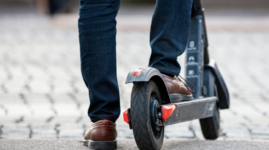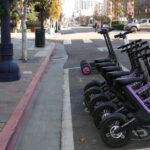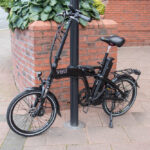E-Scooters Likely to Be Made Legal on New South Wales Roads

The planned trial of shared (rental) e-Scooters in New South Wales had previously faced setbacks when two Sydney councils, the City of Sydney and the Inner West Local Council, originally decided not to participate.
e-Scooter trial
The e-Scooter trial has only recently progressed in 2025 with the NSW Government launching a Shared E-scooter Trial Program across several regional areas including Forster-Tuncurry and Wollongong, with trials running until 30 June 2025. These trials aim to assess demand, safety and community sentiment.
The data from these trials is assisting proposed legislation that would legalise e-scooters on shared paths and roads in NSW later this year.
e-Scooters – a viable transportation option for short distances
In a time of spiraling fuel prices, eScooters only offer a viable economic transport alternative for inner city residents – one that’s good for the climate and won’t clog the city with further traffic congestion.
Without these two councils involved, experts believe the trial will be significantly compromised, because each represent residents and visitors who are the most likely choose rentable eScooters as a transport option if they allowed to be ridden on public roads.
Many coastal towns, particularly those which attract international visitors and students, would also benefit from shared e-Scooter schemes, but the state government is unlikely to pass enabling legislation until the viability of the option is fully explored.
Legal on roads across the nation, except in our state
New South Wales is the only Australian jurisdiction which makes it illegal to ride e-Scooters on public roads and road-related areas.
However, the Government has announced proposed rules under which e-scooters will be legalised, with riders permitted on shared paths and bike lanes, speed limits set at 10 km/h on shared paths and 20 km/h on roads with speed limits of 50 km/h or less, and a minimum rider age of 16.
The main reason for the states hesitation is the overarching concern about community safety.
However, advocates of e-Scooters argue that measures can be implemented to ensure the mode of transport can coexist with motorcycles, cars and trucks – in a similar way to how bicycles already share public roads.
The rules relating to e-scooters in New South Wales
It is currently illegal to ride an eScooter on a road or road related area in New South Wales; they can only be ridden on private property which does not constitute a road-related area.
Those who break the rule face an face an on-the-spot fine (penalty notice) of $78.
If a rider decides to take the matter to court and is found guilty of the offence, the court has the discretion to impose a penalty of up to $2,200. The penalty does not include demerit points.
While it is perfectly legal to buy and sell eScooters, retailers and sellers can face strict penalties if they do not tell customers that eScooters are not permitted on footpaths or roads.
Selling any product or service based on misleading or incorrect information can face up $500,000 for an individual, or $10 million for a corporation.
What is the definition of a road?
A road is defined as an area that is open to or used by the public and is developed for, or has as one of its main uses, the driving or riding of motor vehicles.
What is the definition of a road-related area?
A road-related area is defined as:
- an area that divides a road
- a footpath or nature strip adjacent to a road
- an area that is open to the public and is designated for use by cyclists or animals
- an area that is not a road and that is open to or used by the public for driving, riding or parking vehicles
- a shoulder of a road, or
- any other area that is open to or used by the public and that has been declared under to be an area to which specified provisions of the Road Transport Act or the statutory rules apply.
Sellers must not make false promises
It is currently perfectly permissible for businesses and individuals to sell e-Scooters in New South Wales.
However, it is unlawful for sellers to do so without warning buyers that eScooters are not a legal form of transport on public roads and road-related areas.
The fines for selling any product or service based on misleading information carries significant penalties – up to $500,000 for an individual and for a corporation, the fine is whichever is greater:
- $10 million, or
- three times the value of the benefit received, or
- 10 percent of annual turnover in the preceding year, if the court cannot determine the benefit obtained from the offence.
Misleading or deceptive assertions and unconscionable conduct includes such things as:
- fake reviews and testimonials,
- unfounded predictions and promises,
- wild exaggeration and vague claims,
- offering rebates, prizes and other free items without providing them,
- misleading or altered guarantees, conditions and warranties,
- relying on disclaimers and fine print,
- silence or failure to disclose,
- misleading conduct as to the nature of goods and services, or
- wrongly accepting payments for goods or services.
Going to court for a traffic offence?
If you are going to court for a traffic offence, call or email Sydney Criminal Lawyers anytime to arrange a free first consultation with an experienced, specialist traffic lawyer who will accurately advise you of your options, the best way forward, and fight for the optimal outcome in your specific situation.







